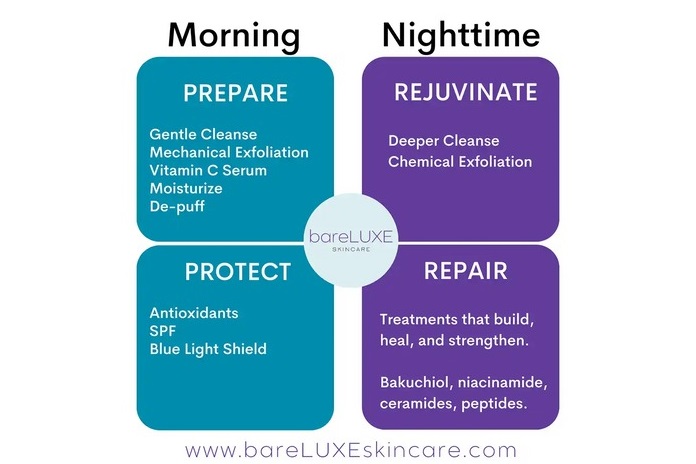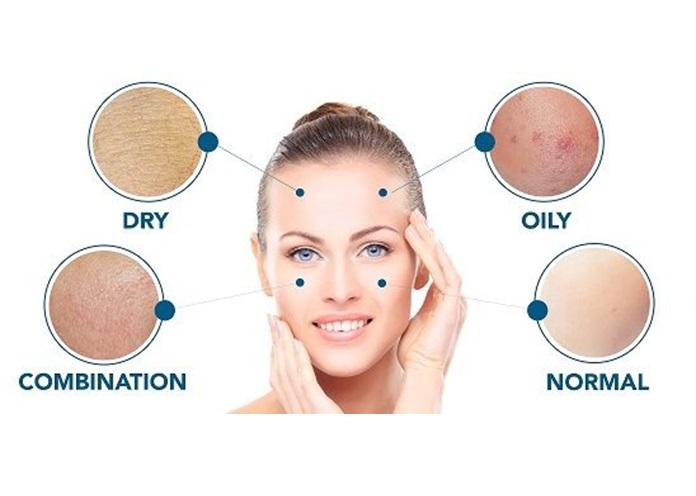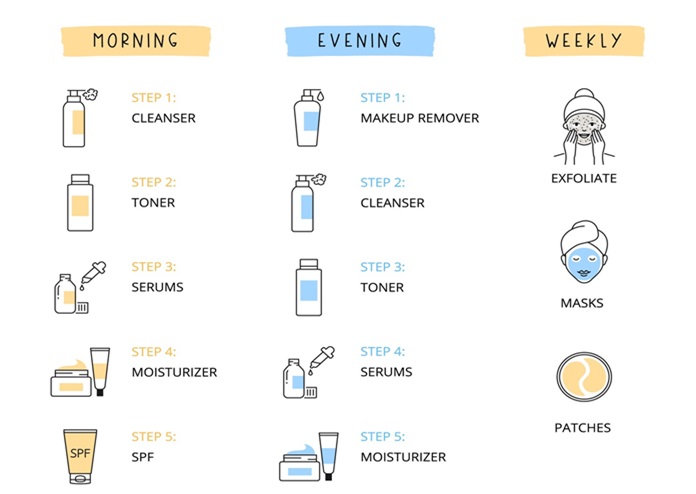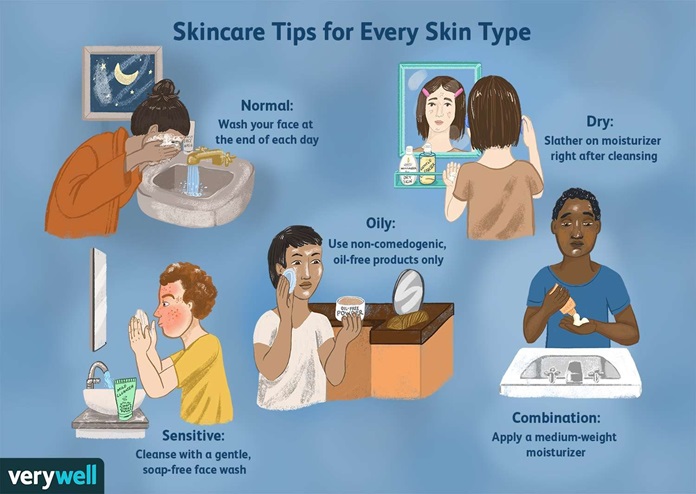Skincare is often associated with the morning routine, but we shouldn’t overlook the importance of nighttime skincare. While we sleep, our skin enters a phase of repair and renewal, actively regenerating and restoring itself. When it comes to skincare, many of us focus on our morning routine but underestimate the significance of nighttime skincare. Nighttime is when our skin goes into repair mode, regenerating and restoring itself while we sleep.
Understanding the Importance of Nighttime Skincare
For these important reasons, nighttime skincare plays a crucial role in preserving a glowing complexion. Here are the reworded sentences for you:
- Cell Renewal: At night, your skin undergoes a peak cell renewal process, creating the perfect conditions for promoting skin repair and rejuvenation. This natural cycle ensures the emergence of fresh, new skin cells, resulting in a smoother and more youthful complexion.
- Repair and Recovery: At night, skincare products are specifically designed to complement the skin’s natural repair processes, aiding in restoring damage caused by daily exposure to UV rays, pollution, and stress. Powerful ingredients such as retinol, peptides, and hyaluronic acid deeply penetrate the skin, targeting specific issues and promoting overall skin wellness.

- Hydration and Moisture: Night creams and serums are packed with intense hydration to replenish moisture levels and fortify the skin’s barrier function. This effectively locks in moisture, prevents water loss, and maintains the skin’s plumpness and suppleness.
- Prevention of Premature Aging: A regular nighttime skincare routine prevents premature aging. You can effectively combat environmental aggressors and maintain a youthful complexion by addressing fine lines, wrinkles, dark spots, and loss of firmness. Your nightly regimen can significantly contribute to the overall health and appearance of your skin.
- Improved Absorption: At night, the skin’s temperature rises, and blood flow increases. This physiological process enhances the absorption of skincare products, allowing active ingredients to penetrate the skin and maximize their beneficial effects deeply.
Discovering Your Skin Type and Concerns
To create a successful nighttime skincare routine for glowing skin, it’s essential to begin by identifying your unique skin type and any specific concerns you may have. By taking these factors into account, we can customize our skincare regimen to effectively target individual issues and enhance the overall health of our skin.
Points to consider when determining your skin type:
- Normal Skin: There are several different skin types, each with its characteristics and needs.
- Dry Skin: Dry skin often lacks moisture, which can lead to a tight and flaky sensation. It may also be more prone to fine lines and wrinkles.
- Oily Skin: Oily skin tends to produce excess sebum, resulting in a shiny appearance and potential issues such as acne and enlarged pores.
- Combination skin: Combination skin is a mix of dry and oily areas, requiring a balanced approach to address different needs in various zones.
- Sensitive skin: Sensitive skin is easily irritated and reactive and may exhibit redness, itching, or a burning sensation with certain products or environmental factors.

Identifying your skin is equally important:
- Acne: Acne is a common skin condition characterized by the presence of pimples, blackheads, and whiteheads.
- Fine lines and wrinkles: Fine lines and wrinkles are signs of aging that may appear on the skin and could benefit from targeted treatments to minimize their visibility.
- Hyperpigmentation: Hyperpigmentation refers to the presence of dark spots or an uneven skin tone, which sun exposure, hormonal changes, or inflammation can cause.
Identifying your specific skin type and concerns is crucial in selecting the right products and techniques to achieve a radiant complexion. By addressing these factors, we can develop a personalized nighttime skincare routine that promotes healthy and glowing skin.
Selecting the Ideal Products for Your Skincare
When it comes to selecting products for your nighttime skincare routine, it’s essential to be mindful of your skin’s unique needs and challenges.

To ensure you’re making the right choices, consider the following steps:
- Understand your skin type: Take the time to identify whether you have dry, oily, combination, sensitive, or normal skin. This will guide you in selecting products that are most compatible with your skin type.
- Address your skin concerns: Whether you’re dealing with acne, fine lines, hyperpigmentation, or dullness, it’s crucial to choose products designed to target your specific concerns. This approach can lead to more effective results.
- Review the ingredients: Look for active ingredients such as retinol, hyaluronic acid, or vitamin C that align with your skincare goals. Additionally, steer clear of products containing harsh chemicals or fragrances that could potentially irritate your skin.
- Conduct patch tests: Before fully incorporating a new product into your routine, perform a patch test to ensure that your skin doesn’t react negatively.
- Seek professional advice: If you’re uncertain about which products are best for you, consider consulting with a dermatologist or skincare expert. Their expertise can provide you with personalized recommendations based on your skin type and concerns.
By following these guidelines, you can be confident that the products you select for your nighttime skincare routine are tailored to meet your skin’s specific requirements, ultimately helping you achieve a healthy and radiant complexion.
Creating a Compatible Skincare Routine
For a luminous and healthy complexion, it’s important to establish a thorough nighttime skincare routine. By following a consistent regimen, we can nourish our skin and achieve a vibrant, glowing look.

Guide on how to create an effective nighttime skincare routine:
- Cleansing: Start by gently cleansing your face to eliminate the day’s accumulation of dirt, oil, and makeup. Using a cleanser that suits your skin type will ensure a deep cleanse without stripping away essential oils.
- Exfoliation: Integrate exfoliation into your routine to slough off dead skin cells and unveil a fresh skin layer. Opt for a gentle exfoliator containing alpha hydroxy acids or beta hydroxy acids to encourage cell turnover.
- Treatment Products: Apply targeted treatment products like serums or ampoules that focus on specific skin concerns such as fine lines, dark spots, or acne. These potent formulations can deeply penetrate the skin during the nighttime repair process.
- Moisturizing: Keep your skin hydrated with a nourishing moisturizer to preserve its moisture barrier and prevent dehydration. Choose a night cream rich in antioxidants and humectants to encourage skin renewal while you sleep.
- Sun Protection: Even as our skin regenerates during sleep, it’s crucial to shield it during the day. Incorporate a rich eye cream into your nighttime routine and occasionally use masks or treatments for added nourishment.
By consistently following these steps, you can establish a nighttime skincare routine that supports skin health and helps you achieve a radiant complexion. Remember, maintaining a routine is essential for skincare success.
FAQ
Why is nighttime skincare important?
Nighttime skincare is crucial for supporting your skin’s natural repair and renewal process while you sleep.
What happens to your skin at night?
During the night time, your skin experiences its highest level of cell renewal which assists in the repair and rejuvenation process. Applying skincare products at night can effectively aid these functions by delivering intense hydration, preventing early aging, and enhancing the absorption of active ingredients.
How do I determine my skin type and concerns?
Understanding your skin types, such as normal, dry, oily, combination, or sensitive, and identifying specific concerns like acne, fine lines, or hyperpigmentation is essential.
